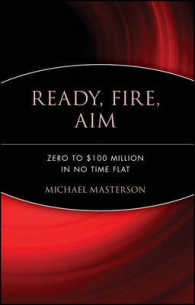- ホーム
- > 洋書
- > 英文書
- > Religion / Ethics
Full Description
Debt finance involving interest payments - the standard method in the global economy - goes against Qur'anic teaching and Shariah law. Wealth creation is therefore one of the greatest challenges facing Muslims and the Islamic world.This book explores the longer term issues of Islamic capital accumulation and its contribution to the development of Muslim societies in the East and West. Although many of these societies remain poor, it is shown that there is much positive experience to learn from - especially that wealth creation is most successful when the institutions created to harness and deploy funds share the values of the societies they serve. It can be seen that adherence to religious values brings social development, and that moral financing makes good business sense.The book includes:* evaluation of Asian Islamic banking experiences* assessment of Islamic banking efficiency and service quality* analysis of Islamic insurance and risk management, and equity finance and venture capitalCountries covered include:IranPakistanSudanKuwaitEgyptMalaysiaBahrainJordanSaudi ArabiaThe book provides a comprehensive discussion of the various aspects of Islamic finance, focusing on key countries and institutions in a coherent manner and bringing both breadth and depth to the subject.Key Features:* First book to bridge the gap between Islamic economic theory and financial practice* Considers risk management in accordance with Islamic law by exploring Islamic mortgages and insurance* Looks at equity finance, venture capital and the stock market from an Islamic perspective* Offers detailed case studies of country experiences of Islamic capital formation and wealth accumulation* Includes a glossary of Arabic terms
Contents
Introduction; Munnawar Iqbal and Rodney Wilson; (Islamic Development Bank, Jeddah and University of Durham); Part 1: Whither Islamic banking?; 1. Islamic banking at the crossroads: theory versus practice; Zubair Hasan; (International Islamic University, Malaysia); 2. Islamic banking modes of finance: proposals for further evolution; Abdel-Rahman Yousri Ahmad; (University of Alexandria); Part 2: Islamic retail banking experiences; 3. Wealth mobilisation by Islamic banks: the Malaysian case; Sudin Haron and Badrul Hisham Kamaruddin; (Universiti Utara Malaysia); 4. Managing and measuring customer service quality in Islamic banks: a study of the Kuwait Finance House; Abdulqawi Radman Mohammed Othman and H. Lynn Owen; (Tadhamon Islamic Bank, Yemen and University of Wales, Lampeter); 5. The lending policies of Islamic banks in Iran; Nezamaddin Makiyan; (Yazd University, Iran); Part 3: Measuring Islamic banking efficiency; 6. Efficiency in Arab banking; Idries Al-Jarrah and Philip Molyneux; (University of Wales, Bangor); 7. Determinants of Islamic banking profitability; M. Kabir Hassan and Abdel-Hameed Bashir; (University of New Orleans and Gambling State University); 8. Allocative and technical efficiency in Sudanese Islamic banks: an empirical investigation; Abd Elrhman Elzahi Saaid; (International Islamic University, Malaysia); Part 4: Islamic Mortgages, Insurance and Risk Management; 9. Islamic mortgages in the United Kingdom; Humayon Dar; (University of Loughborough); 10. Wealth creation through takaful (Islamic insurance); Mervyn Lewis; (University of South Australia); 11. Towards an optimal risk management tool for profit sharing finance; Seif I. Tag El-Din; (Markfield Institute of Higher Education, Leicester); Part 5: Equity finance and venture capital; 12. Stock market operation and equity price determination in an economy with an interest free banking system: the case of Iran; Karim Eslamloueyan; (Shiraz University, Iran); 13. The demand for musharakah in urban Egypt by small business as a test of the pecking order hypothesis; Mohamed Nasr; (Advanced Management Institute, Cairo); 14. Islamic finance and venture capital: a practical approach; Saqib Rashid; (Cairo University Fulbright Scholar).








